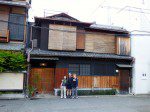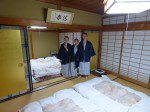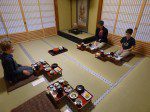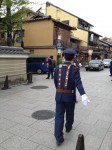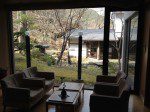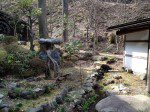Thoughts from the Shinkasen
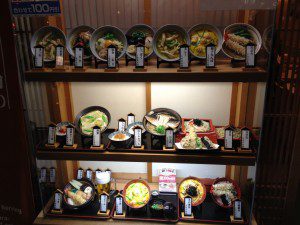
Our last day in Japan. We caught the Shinkansen up to Tokyo, left our bags at the station (a process which cost us three times as much as expected because Barak Obama’s visit meant every locker was closed for the duration) and went to the Edo Museum.
The Edo Tokyo Museum is a stunner. It sets out the history of the town clearly and interestingly; and because the history of Japan is so tightly caught up in its capital you get a great sense of Japan’s history from the Shogunate period to the present day. But beyond the sweep of history you also get a wonderful view of how ordinary people lived, which was very refreshing. The displays on the pre-war poverty, the complexities of the Japanese industrial revolution and the devastation caused by bombing in WW2 gave quite a different insight into Japan from the temples and rural calm that we had seen elsewhere.
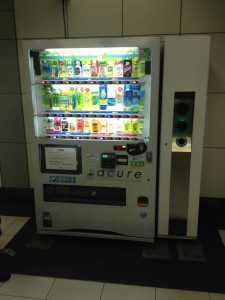
Anyway as we flowed through the countryside at blurring speed this morning, we took time out from our endless games of 500 to agree on some thoughts on what makes Japan so different to other places.
Clean, so clean
There’s just no rubbish to speak of anywhere we’ve been in Japan. The streets are spotless, shopkeepers sweep the space outside their shop regularly – and not just the footpath, but the street. We’ve seen one, single piece of graffiti in two weeks. Even though bins are few and far between, no one drops rubbish – and the only warning signs about loitering are clearly aimed at foreigners. Workmen dress neatly. Cars are all spotless. There’s an apparent obsession with cleanliness reflected in the taking off of shoes as you enter buildings and in…
Toilets
Japanese toilets fit right in with their obsession with cleanliness. You can basically navigate the toilet experience with only a few presses of buttons, from warmed seats, to bidets, to air-dried bottoms they have the lot. Generally it seems over the top and wasteful, but they also, often, have the clever idea of placing a small sink on top of the toilet cistern, so that the water from washing your hands fills the cistern.
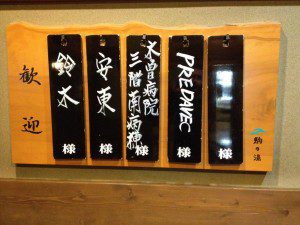
English
Before we came to Japan, we were warned that no one spoke English. While that is not, quite, true it is startling how little is spoken even in touristy places. But it hasn’t turned out to be an issue for two reasons. First, transport all has English signs so that makes getting about very simple. Second, we’ve found the Japanese people unfailingly polite and friendly. Everyone from passersby to train conductors will go out of their way to make sure you’re OK without the slightest sign of exasperation at your lack of their language, and that’s probably because of…
Manners
I would hate to be Japanese because I’m not good with uniforms and rigid structures. But from a visitors point of view it makes things very easy and clear. There is an extraordinary service-orientation wherever you look and it’s combined with a set of manners that are reassuring for a traveler but probably a nightmare to live with. Every single time a conductor comes into or leaves a train carriage they bow to everyone. Saying ‘thank you’ in Japanese can lead to a Kafkaesque exchange of thank-yous and you’re-welcomes that appears to have no exit. Everyone wears immaculate uniforms including gloves. Behind it all though there is a sense that the Japanese take pride in their presentation and doing their job right – in many ways Japan is like I understood Switzerland to be 50 years ago.
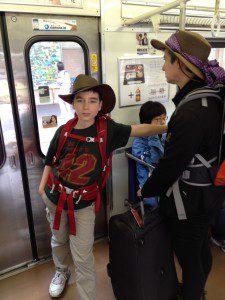
Public transport and bikes
Public transport is a complete joy. Trains and buses run frequently. They are clearly signposted in every way – in English when needed, but often just with clear pictures, diagrams and colour-coding. Trains run constantly – Kyoto to Tokyo trains were departing at two-minute intervals this morning. Even on buses, which we usually hate taking because it’s hard to tell where to get off, there are clear signs telling you where you are and what to pay.
Partly because, we think, of the great public transport there are bikes everywhere in the country and the city. There aren’t so many cars on the roads, they are almost all small, and drivers are polite and non-aggressive. And no one seems to mind people riding on the footpath.
Vending machines
But in spite of the sense of a constrained society, or perhaps because of it, there are things we find lax and strange. There’s simply no possibility of going far without access to a bottle of water, a can of coffee, or a snack. Vending machines, especially drink vending machines, are everywhere: You can be in the middle of nowhere and there’ll be a vending machine by the roadside. One of the truly different things to Australian eyes is the vending machines selling beer and cigarettes – we’re still not at all clear on how access to them is regulated on any level.
Overall Japan has been a fascinating experience: It’s first-World exotic. The cultural and historical differences are palpable, but it’s entirely safe and you can experience it without any twinges of exploitative guilt. The depth of history rivals, and often exceeds, Europe’s – but at the same time the Japanese seem to have a greater sense of continuity with that history. Japan has been a wonderful experience; and one we hope to repeat sometime in the future.
